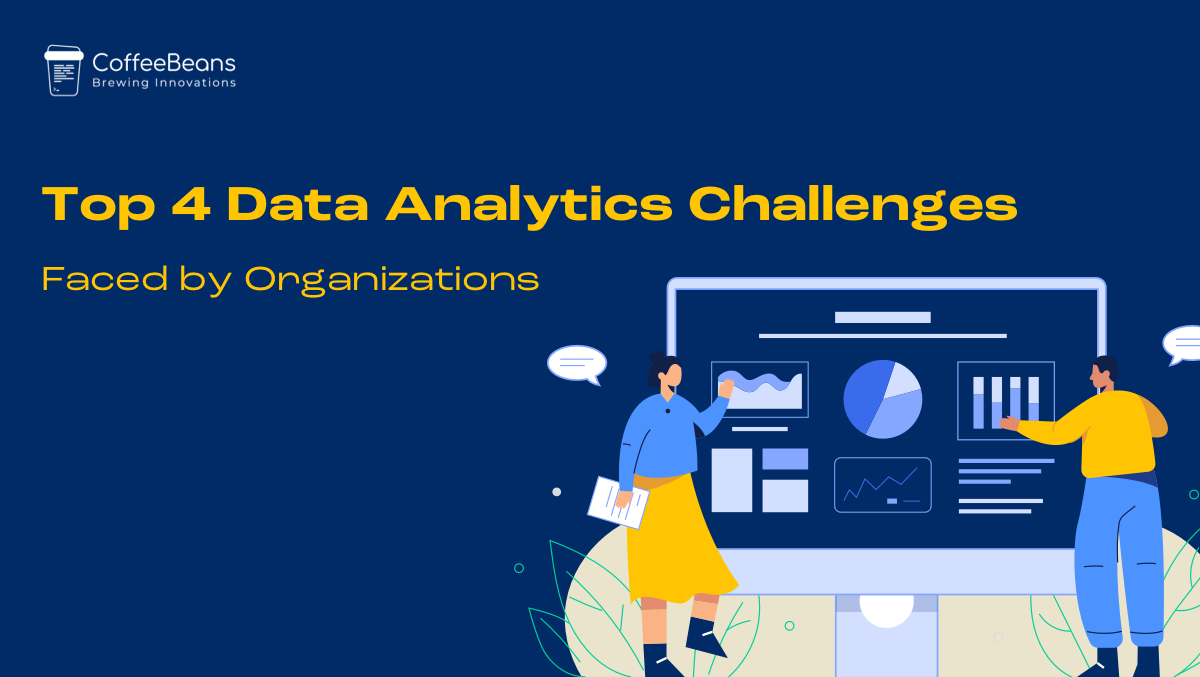Top 4 Data Analytics Challenges Faced by Organizations

May 12, 2024
Data is the modern currency with increasing relevance as well as impact. As per IBM, over 2.5 quintillion bytes of data are created each day. Forbes reveals a startling fact that only around 0.5% of all data is analyzed. Also, the U.S. Bureau of Labor Statistics estimates that the demand for data analytics jobs will grow by 25% from 2020 to 2030. With staggering amounts of data generated everyday there is an urgent need to store, process and analyze the data to help organizations properly function and grow.
We look at the top 4 Data Analytics challenges currently faced by organizations.

- Integrating Different Types of Data
Data in a particular organization may be structured, semi-structured or unstructured. The sources may be websites, social media platforms, CRM, ERP, and others. In order to perform data analysis, the data must be integrated. This means challenges in homogenizing data originating from diverse sources and having different formats.
Major obstacles to data integration today are the existence of legacy systems as well as siloed data repositories. The challenge for organizations is to have an effective strategy and leveraging existing technology to overcome these barriers in order to deliver a unified data ecosystem.
As those involved in the data industry know very well, frequently an organization's data originates from multiple sources. Before data analysis, the whole data needs to be consolidated. Fortunately, there are quite reliable tools to gather data from multiple as well as diverse data sources. These tools assemble all the relevant data and produce comprehensive reports almost flawlessly.
**2. Resistance by Employees **
Employees of an organization may distrust or fear the implementation of data analytics. Issues include doubts whether data analytics is needed at all. They may prefer old fashioned methods such as manual data analysis and data predictions based on gut feeling. There may also be reluctance by some to learn new and unfamiliar technologies. Some staff may fear being replaced as their work will be done by automated software. Efforts must be taken to familiarize the staff with the latest data analytics techniques and technology. Training workshops should be organized to familiarize staff with contemporary data analytics techniques and to facilitate knowledge transfer. Each employee must be reassured that they will not lose their position or have their salaries cut. Also, efforts must be put in to make all the staff realize that adopting the new technology will make them better at their work. They will become more valuable contributors to the organization’s growth.
3. Selecting a Suitable Analytics Tool
Given the enormous amount of data being generated globally on a daily basis old methods of analytics do not work. Humans simply do not have the capacity to manually access vast and complex volumes of data. Old data analytics tools will make organizations lose their competitive edge. Entities adopting the latest data analytics tools will capture market share and be the leaders.
Do research on the Internet to shortlist the best data analytics tool available in the market. Of course, there may be constraints such as your budget and whether you have the human resources competent enough to use the tool properly as well as effectively. Read reviews to determine the reputation as well as pros and cons of different data analytics tools. Invest in a quality data analytics tool based on factors such as the size of your organization, the amount and complexity of data to handle and the user friendliness of the tool.
You may have to hire fresh staff to use the tool in the event you do not have the in-house capability. Otherwise outsource the work to a trustworthy, competent, and experienced firm specializing in the field of data analytics.
**4. Shortage of Data Professionals **
Data comes in different formats as well as different sources. New regulations are being enacted regarding the governance data. Not only is the volume of data increasing at an unprecedented pace, so is the complexity. New data analytics tools are being introduced in the market. The demand for data scientists, data analysts, data engineers and other types of data professionals is lagging behind the supply. Many organizations are vying for the relatively limited base of qualified data professionals.
You can offer higher salaries to attract talent if you have the capacity to do so. Otherwise, you can partner with educational institutions to train your existing staff. Online training modules are a good option as participants can learn at their own pace.
Other Data Analytics Challenges Faced by Organizations
Note that the above mentioned data analytics challenges are not the only ones contemporary organizations face. The other data analytics challenges include scalability, performance, business intelligence modernization, data quality assurance, low quality data, data security, budget constraints, absence of a strong data culture and developing a robust data warehousing architecture. Today, there is a pressing need to capture actionable insights from the unprocessed data originating from both internal and external entities. Data Analytics deftly solves this systemic problem. But you need to select the right Data Analytics firm with impeccable ethics and immaculate competence.
Why Outsource Data Analytics?
Organizations need to concentrate on their competencies to survive as well as thrive in the market. Data Analytics is a complex discipline with a significant learning curve. By the time your staff learns certain data analytics tools the tools themselves may become obsolete. Fortunately, there are organizations specializing in data analytics tools and techniques. They have a large pool of data professionals with diverse specializations and relevant experience. Save money, time and effort as well as stay up-to-date by aligning with such organizations.
Why Us?
The CoffeeBeans leadership and staff are well versed with the challenging data analytics domain. By partnering with us, organizations can have confidence in obtaining tangible value with full transparency at an affordable rate. Our team is up-to-date with modern data analytics strategies and technology which enables us to supply diverse organizations with a seamless as well as highly satisfactory experience. Reach out to us to know how we help facilitate a solution to your current and future data analytics challenges.

